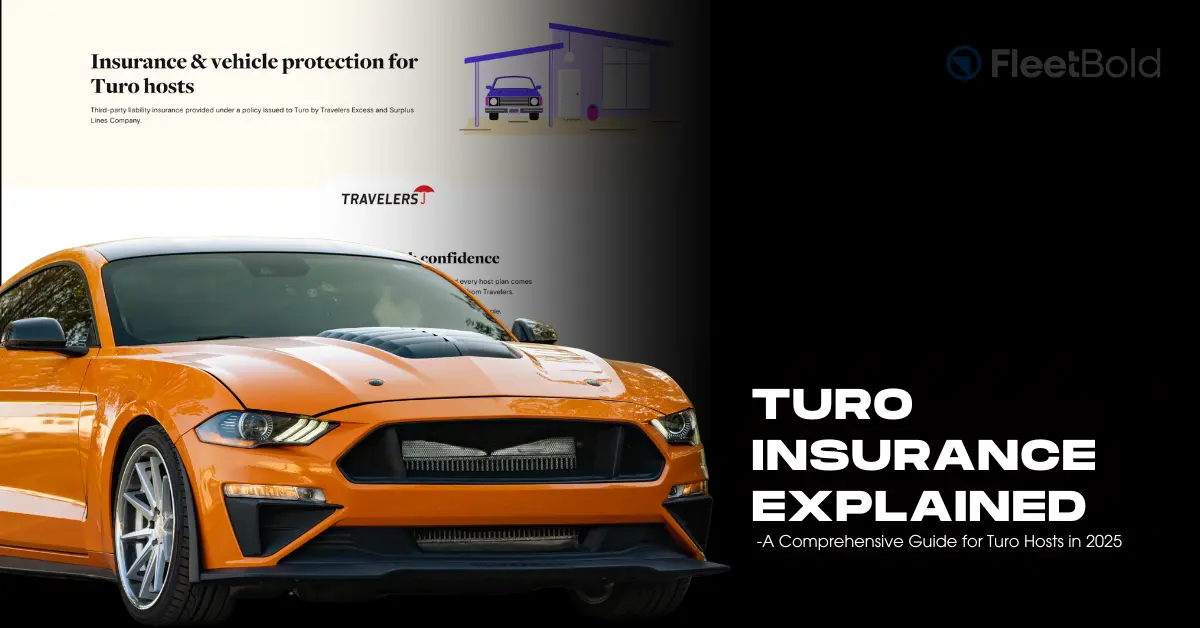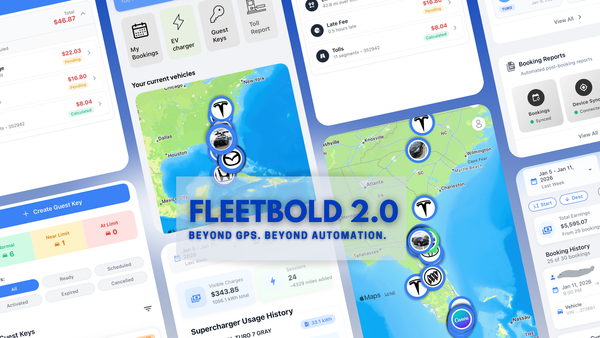Turo Insurance Explained: A Comprehensive Guide for Turo Hosts in 2025
Turo insurance guide for 2025: Learn how Turo hosts can pick the best protection plan & use FleetBold to manage risks. Host smarter!

As a Turo host, understanding Turo insurance and protection plans is crucial to protecting your vehicle, minimizing risks, and maximizing earnings. Whether you're a new Turo host managing a single car or scaling up with tools like FleetBold for fleet management, getting the details right on Turo insurance can make or break your experience. In this in-depth guide, we'll break down how Turo's host protection works, the available plans, coverage details, and key considerations. By the end, you'll have the knowledge to choose the best Turo insurance option for your needs.
Note: This information is based on Turo's official policies as of August 2025. Always check the Turo Help Center for the latest updates, as policies can change.
What is Turo Host Protection?
Turo, the leading peer-to-peer car-sharing platform, offers built-in protection plans specifically designed for Turo hosts. These plans combine third-party liability insurance with contractual reimbursement for physical damage to your vehicle during rentals. Unlike traditional car insurance, Turo's protection is tailored for the car-sharing economy, covering incidents that occur while your car is rented out on the platform.
For Turo hosts, this means peace of mind during trips, but it's important to note that Turo is not an insurance company. The liability portion is provided by Travelers Excess and Surplus Lines Company, while physical damage reimbursement comes directly from Turo. This hybrid approach helps Turo hosts avoid gaps in coverage that personal auto policies often exclude for ridesharing or car-sharing activities.
Key benefits for Turo hosts:
- Automatic Coverage: Protection kicks in automatically for every trip booked through Turo.
- Earnings Flexibility: Choose a plan that balances higher earnings with lower deductibles.
- Nationwide Availability: Available in all US states, with some state-specific variations (e.g., higher liability in New York).
However, Turo insurance only applies during active trips. For off-trip periods (when your car isn't rented), you'll need separate personal or third-party insurance more on that briefly later.
How Does Turo Insurance Work for Hosts?
Turo insurance activates the moment a guest starts a trip and ends when they return the vehicle. Here's the step-by-step process:
- Choosing a Plan: As a Turo host, you select one of five protection plans when listing your vehicle. This determines your earnings percentage from the trip price and your deductible for physical damage.
- During the Trip: If an accident or damage occurs, the guest reports it via the Turo app. Liability claims go through Travelers, while physical damage claims are handled by Turo.
- Post-Trip Claims: Hosts must document the vehicle's condition with pre- and post-trip photos in the app. Report any damage within 24 hours of the trip's end to qualify for reimbursement.
- Reimbursement: Turo reimburses eligible physical damage costs above your deductible, up to the vehicle's actual cash value (ACV) or $200,000, whichever is less.
- Integration with Tools: For fleet owners using platforms like FleetBold, you can track insurance-related data alongside reservations and maintenance, streamlining operations for multiple vehicles.
Changes to your protection plan only affect future trips, not ongoing ones. If you're a Turo host with high-value cars (market value $125,000+), you'll need to provide proof of a manufacturer-installed tracker to qualify for protection.
The Five Turo Protection Plans: A Detailed Comparison
Turo offers five host protection plans, named after the percentage of the trip price you earn (e.g., 60 plan means you keep 60%, and Turo takes 40%). Lower earnings plans provide better protection (lower or no deductibles), while higher earnings plans shift more risk to the host via higher deductibles.
Here's a comparison table for quick reference:
| Plan Name | Earnings Percentage | Liability Coverage | Physical Damage Deductible | Physical Damage Reimbursement |
|---|---|---|---|---|
| 60 Plan | 60% of trip price | Up to $750,000 | $0 | 100% of eligible costs |
| 75 Plan | 75% of trip price | Up to $750,000 | $250 | 100% above deductible |
| 80 Plan | 80% of trip price | Up to $750,000 | $750 | 100% above deductible |
| 85 Plan | 85% of trip price | Up to $750,000 | $1,625 | 100% above deductible |
| 90 Plan | 90% of trip price | Up to $750,000 | $2,500 | 100% above deductible |
Source: Turo official guidelines, 2025.
- Choosing the Right Plan: New Turo hosts often start with the 60 or 75 plan for minimal out-of-pocket risk. Experienced hosts or those using FleetBold for efficient fleet management might opt for higher-earning plans like 85 or 90 to boost profitability, especially in high-demand markets.
- State Variations: In New York, liability jumps to $1,250,000. In Washington, physical damage is insured by Turo-purchased policies, but host responsibilities remain the same.
Liability Coverage Details for Turo Hosts
All Turo protection plans include up to $750,000 in third-party liability insurance, covering bodily injury or property damage to others (not your vehicle) caused by the guest during the trip. This is secondary to any other applicable insurance and provided by Travelers.
- What It Covers: Medical bills, property repairs, and legal fees for third-party claims.
- Exclusions: Doesn't cover damage to your own car, the guest's injuries, or intentional acts.
- Host Tip: As a Turo host, ensure your personal policy doesn't exclude car-sharing; otherwise, you could face denial of claims off-trip.
For questions, contact Turo Insurance Agency at (415) 508-0283.
Physical Damage Protection: What Turo Covers
Turo's contractual reimbursement for physical damage includes collisions, theft, fire, and vandalism during trips. Coverage is up to the ACV of your vehicle or $200,000.
- Deductibles: Vary by plan (see table above). You're responsible for paying the deductible first; Turo covers the rest for eligible claims.
- Claim Process: Submit photos, estimates, and reports via the app. Delays beyond 24 hours can void reimbursement.
- Replacement Vehicle: Not covered hosts bear the cost of downtime during repairs.
Using tools like FleetBold can help Turo hosts monitor vehicle status and quickly document issues, reducing claim disputes.
Exclusions and Limitations in Turo Insurance
No protection plan is foolproof. Common exclusions include:
- Wear and Tear: Dings, dents, scratches, or cracks under 3 inches; interior stains or odors not tied to a specific incident.
- Loss of Income: No reimbursement for lost earnings while your car is repaired.
- Off-Trip Incidents: Coverage only applies during Turo-booked trips.
- Other: Mechanical breakdowns, towing (unless part of a covered incident), or damage from prohibited uses (e.g., racing).
Always review Turo's terms for full exclusions.
Host Responsibilities: Staying Protected as a Turo Host
To fully benefit from Turo insurance:
- Maintain Personal Insurance: Required by law for non-Turo use. Check for car-sharing exclusions.
- Document Everything: Use the app's check-in/checkout for time-stamped photos.
- Report Promptly: Within 24 hours post-trip.
- Vehicle Maintenance: Keep your car in good condition to avoid claim denials.
For fleet Turo hosts, integrating FleetBold can automate tracking, ensuring compliance and faster claims.
Briefly: Supplementing with Off-Trip Rental Insurance
While Turo insurance covers active trips, off-trip periods require separate coverage. Options like Tint, Addify, ABI, and Roamly offer specialized policies for Turo hosts when vehicles are idle or in personal use. These can bridge gaps in personal policies, but we'll dive deeper into them in a future blog post. For now, explore Turo's off-trip insurance resources if needed.
Tips for Turo Hosts: Leveraging Tools like FleetBold
To optimize your Turo hosting:
- Start with a lower-deductible plan if you're risk-averse.
- Use FleetBold for fleet management track insurance claims, reservations, and maintenance in one app, ideal for scaling your Turo business.
- Review your plan annually, especially with Turo's 2025 updates on high-value trackers.
Conclusion: Empower Your Turo Hosting with Solid Insurance Knowledge
Mastering Turo insurance is essential for any Turo host aiming for long-term success. By selecting the right protection plan and fulfilling your responsibilities, you can protect your assets while enjoying the flexibility of the platform. Tools like FleetBold further enhance efficiency for multi-car operations. If you're ready to list your vehicle, head to Turo.com and choose a plan that fits your risk tolerance and earnings goals.
Remember, this guide is for informational purposes consult Turo directly or a professional for personalized advice.
FAQs: Common Questions About Turo Insurance for Hosts
What does Turo insurance cost?
It doesn't have a separate cost; it's built into your earnings share. Higher earnings plans mean higher deductibles but no upfront fees.
Can I change my Turo protection plan mid-year?
Yes, but changes only apply to new trips.
Does Turo insurance cover theft?
Yes, under physical damage reimbursement, subject to your deductible.
Is Turo insurance enough, or do I need more?
It covers trips, but supplement with off-trip options like Roamly for full protection.
How does FleetBold help with Turo insurance?
FleetBold streamlines fleet tracking, helping you manage claims and documentation efficiently.
Keywords: Turo Host, FleetBold, Turo, Turo Insurance






